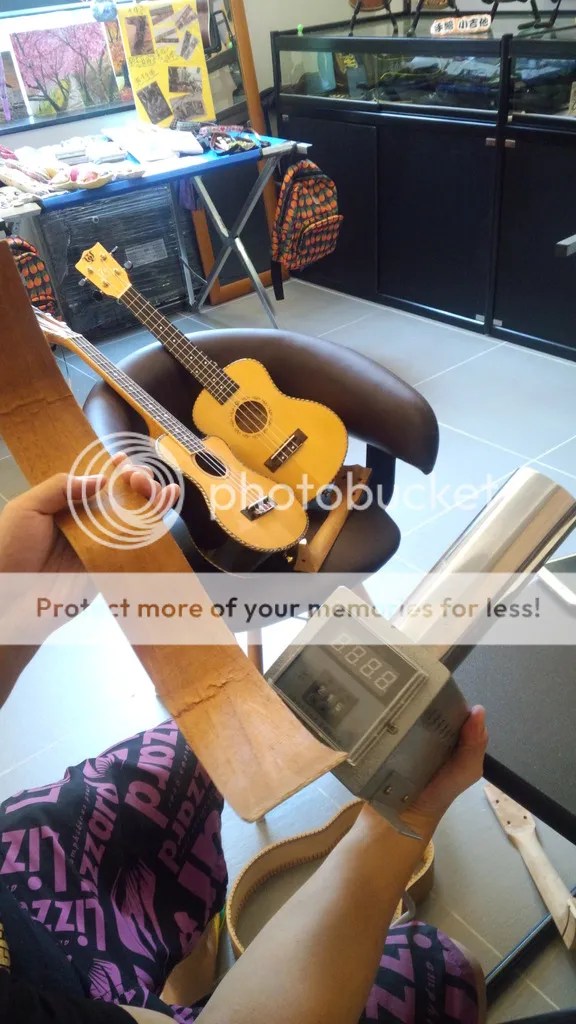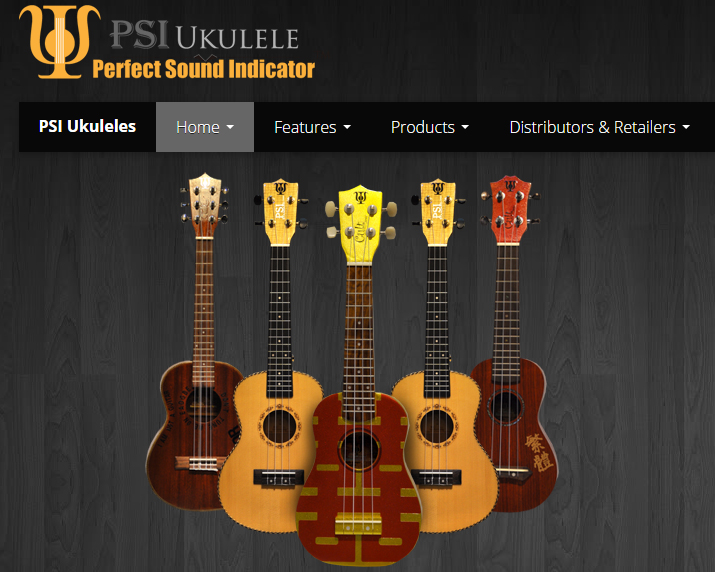Content
1. Background
As one of the largest entrepot in the world, most established ukulele brands are readily available in Hong Kong, including the famous Hawaiian K brands. However, luthiery is a very rare profession here, and it is a no easy task to customize a personalized ukulele locally.
I recently have the pleasure to interview Tok Lau, a ukulele luthier in Hong Kong and the mind behind a new brand called PSI Ukuleles. Amid the high labour cost and rent, Tok and his friends are striving to provide quality ukuleles with a vision of improving local music education.
2. PSI Ukuleles: An Overview
PSI stands for Perfect Sound Indicator. Having a blingy outlook, many of its structural- acoustic features are based on the Spanish guitars. PSI offers mainly 2 series: Premium Series which are handcrafted in a Hong Kong workshop with customs, and the Standard Series which are made in China.
3. How PSI Ukuleles began
Tok was working in the NGO industry before he entered the music business. Since secondary school he has learnt to play a few Chinese and western instruments. He recalled the enjoyment of taking the Design & Technology lessons (curriculum mainly consists of elementary wood- & metal-work trainings). During free time he played in an amateur band as a bass player and liked to DIY the decorations on his musical gears.
He later decided to turn his interest into business, and formed Wave Music with his friend. The shop sold different music instruments and accessories. It was when he first encountered ukulele.
The Wave Music venture did not last long. Tok made the best out of the worst: he started to dissemble the leftover B-stock guitars and study their construction. To advance his knowledge he became an apprentice under Matthew Wan, an experienced acoustic guitar luthier based in Hong Kong. He also bought books online to learn about guitar construction.
At the year 2012 he formed PSI Ukuleles and an NGO called Ukulele Fedaration Hong Kong (UFHK will be featured in another blog article) and formally embarked his career as a ukulele luthier.
4. PSI Construction
Inherit from the guitar construction techniques, Tok uses fan bracing and Spanish heel for his ukuleles. Spanish heel, as Tok explained, can enhance the vibration transmitted from the strings along the ukulele neck, and thus a better sustain.
Tok introduces different joints used in guitar and ukulele construction.

He considered the bridge as the most important acoustic component of the ukulele; to avoid deformation of soundboard and neck due to weather and tension from strings, Tok designed a slightly inclined saddle towards the butt.
Before sticking the bridge onto the soundboard, he would maximize the surface area of contact, and therefore optimize the sound transmission, by grinding the bridge with precision.
PSI has its soundport positioned at the lower curved part of the sideboard, in order to let the player here the sound from the bracing.(Source: GotAUkulele.com)
This model’s special bracing design, borrowed from a traditional Japanese instrument called Shamiesen, contributes to a distinctive percussive sound at the higher pitches.
5. Premium Series & Standard Series
PSI Premium Series are produced in a Hong Kong workshop, with materials including Mahogany, Italian Acacia and select Spruce. LR Baggs Five O is adopted as the pickup system. Tok’s personal ukulele also comes from this series, showing his confidence over his own products.

Standard Series features a wide range of woods, from cedar, ash to walnut and ebony.
Rattan model with a creative twist: the plant inlay is used to replace the traditional fretboard markers.

6.Special series
Tod and his friends in UFHK hope to bring about positive changes through music. For this reason he designed the Charity Series. The below shows the PSI CHR model, which is designed for donation and supporting NGOs, community services, and long stay hospital patients. As the PSI Official website states, “Music Can Heal” with love.
Charity Series in a US hospital.

The Cult Series incorporated different Hong Kong elements such as models“囍” and “繁體”.
“囍Hei” stands for double happiness for newly weds; this character embodied the collective memory of Hong Kongers for it was a partial name of a demolished cultural street in Hong Kong.
Meanwhile, “繁體Fan Tai”, meaning traditional Chinese character system, has been the standard of Chinese writing for more than 1,800 years. It is still being the official written language of Hong Kong, Taiwan and Macau, as opposed to the simplified characters adopted by Mainland China and different Asian Chinese communities.
Other PSI products include U Bass, pickguard and various ukulele accessories.

7. PSI in production
Tok shows the bending iron tool for bending the side woodboards.

The temperature of the iron is shown on the meter.

The mold for side boards. As the woodboards would recoil after ironing, the board needed to be ironed repeatly every few days before it takes the proper shape.

Different clamp tools (left to right: C-, F- & A- shaped) for holding the wooden parts together.

Wood pieces for building a ukulele.

7. Challenges
For many new-startups, it is always a big question as to how to break-even. PSI Standard series are produced in China; if the order quantity is too small, no factory would be willing to take the job; contrarily it would be difficult for a new brand to store and sell its excessive stock. Currently PSI is available on Uke Republic and Southern Ukulele Store, as well as some local stores, and the brand is looking forward to having more international dealers.
Tok teaches ukulele playing classes and making classes. This is a teaching note about the density of different tonal woods.

8. Future plans
For most ukulele brands and shops, the major aim is to spread the uke culture. PSI looks differently. Tok and his friends saw the inadequacy of local music education in the current school curriculum, and would like to offer an affordable option for the underprivileged kids to explore their music potential.
The ultimate goal for PSI Ukuleles, as Tok explained, is to give out all the profit to support this cause. Hopefully we can witness the change in near future.
James Hill, a well-known Canadian uker, promotes the incorporation of ukulele into Canadian school music curriculum, and established the JHUI Certification to systemize ukulele music teaching worldwide. James himself was a benefiter of a music programme of a similar nature during middle school.
The James Hill Ukulele Initative Teacher Certification Program from The Ukulele Way on Vimeo.








發表留言